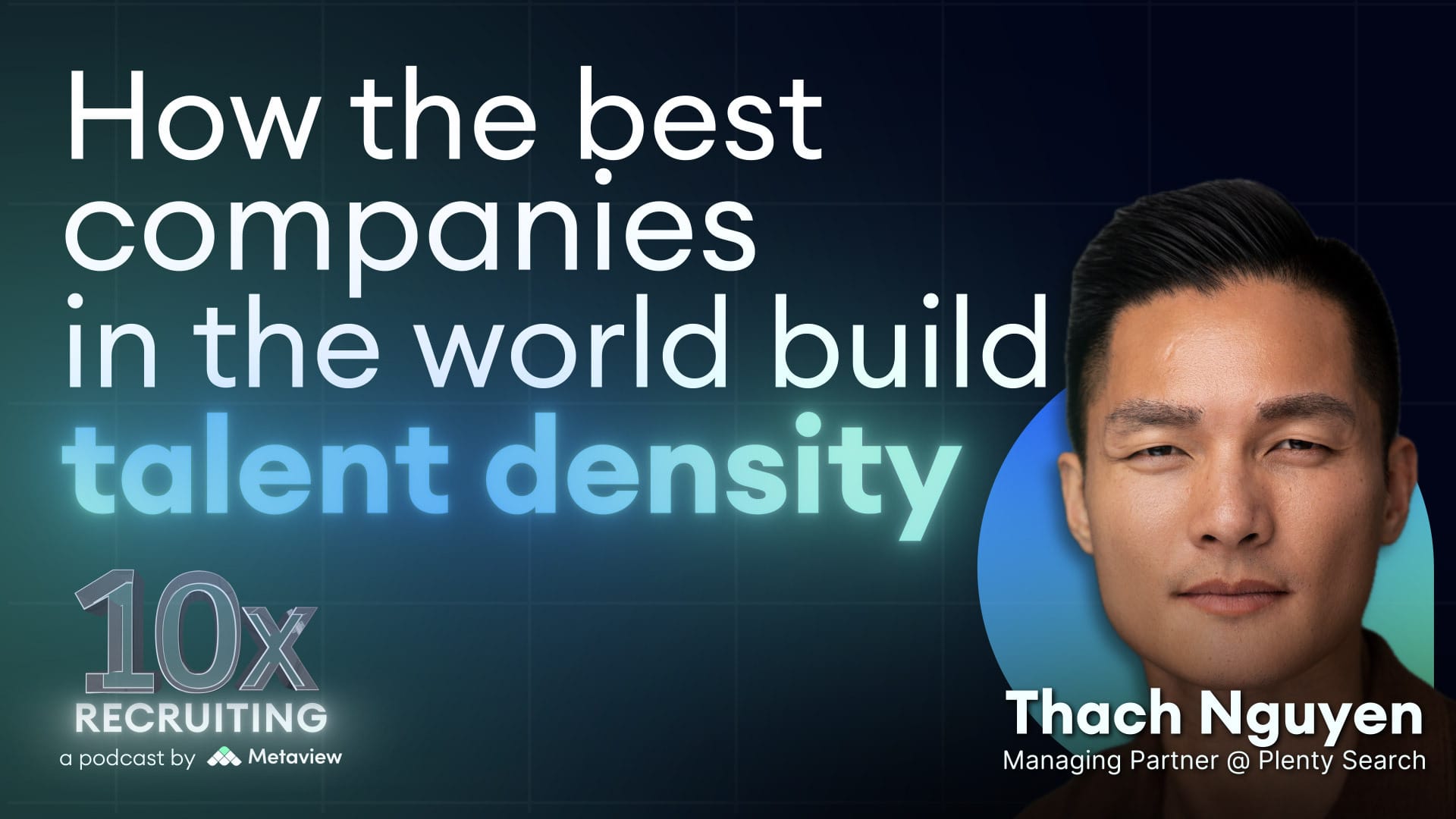In this episode Nolan sits down with Thach Nguyen, a recruiting leader who’s made his mark at heavy hitters like Airbnb, Sword, & Google and now runs his own exec search firm, Plenty Search. They cover what recruiting can learn from sales, why incentives in recruiting are out of whack, and the power of finding undiscovered talent.
Listen, like, and subscribe on:
Or wherever you get your podcasts
🔑 Key moments (audio episode) 🔑
04:53 How the best companies in the world build talent density
08:59 Founders' discomfort with HR
12:44 It’s ok to ask dumb questions to understand the business
15:43 Why the recruiting role is outdated
17:00 The 2 key things recruiters should focus on for success
20:45 Recruiting shouldn’t be so black and white
23:50 Creative strategies for giving founder feedback
27:35 The power of identifying undiscovered talent
31:42 Grit and perseverance in startups
33:25 Embracing loyalty over traditional resumes
Key Takeaways
- Treat recruiting like a product. A great hire doesn’t stick around without a great employee experience — one that delivers learning, growth, and impact from day one.
- Most recruiters are set up to fail. Sales teams get structured onboarding, competitive intel, and messaging support. Recruiting deserves the same rigor.
- Talent density starts with clear thinking. Recruiters who understand the business, speak with candor, and seek out overlooked talent build better, longer-lasting teams.
"I've seen that talent is a huge differentiator. When you see it with your own eyes, it's actually pretty incredible — it's not just this commonly used cliché phrase. It's pretty amazing to see how hiring the right people can change the trajectory of your business right before your eyes." — Thach Nguyen
Big tech companies can outspend and out-brand just about anyone. So how do smaller teams build a talent advantage — and actually win?
That’s the question Nolan Church and Thach Nguyen tackle in this episode of the 10x Recruiting podcast.
Thach is the founder of Plenty Search and has built recruiting functions at heavy hitters like Google, Airbnb, and Sword Health. He’s hired thousands and helped dozens of startups scale — and has strong opinions about what most companies get wrong.
Treat people like a product
When Thach joined Sword Health, the company had zero customers, zero revenue, and zero U.S. employees.
Six years later, Sword is valued at $3 billion.
The reason? Talent.
"Companies with the highest growth and largest revenue aren't necessarily the ones with the best sales teams," Thach explains. "Your sales teams are only as good as your product. And when it comes to recruiting, your product is your people."
The takeaway: recruiting isn’t just about filling roles. It’s about building a strong employee experience. Because great people want to work where other great people already are.
And like a product, your talent offering needs to deliver value. What does a candidate get in return for choosing your company over a better-known competitor? Are you offering learning opportunities, high-impact work, and career-defining challenges? These are the differentiators that make candidates say yes — and stay.
Stop throwing recruiters in the deep end
Most companies put sales hires through rigorous onboarding. Bootcamps, product training, call scripts, messaging practice, the works.
But recruiters? "They get a LinkedIn license and an email address and are told to start hiring," Thach says.
It’s a broken setup. Recruiters are expected to pitch the company, qualify candidates, manage hiring managers, run interviews, close offers, and sometimes even do scheduling or sourcing. And they’re doing it without clear positioning, a defined competitor set, or any context on how the business works.
If that sounds like a recipe for failure, it is.
The fix isn’t complicated: Set the recruiting team up like sales. Provide a company overview. Train them on the product. Introduce them to top performers. Walk through who your competitors are and why candidates might choose them instead. That context creates confidence — and confidence makes for better hiring outcomes.
The recruiter role is broken — here’s how to fix it
You can’t expect one person to do ten jobs well. Both Nolan and Thach agree: It’s time to rethink what we ask recruiters to do.
At a minimum, Thach says, they should be excellent at two things:
- Building strong relationships with candidates and hiring managers
- Understanding the role deeply enough to identify who will succeed
That means cutting everything else. Scheduling? Automate it. Sourcing? Offload or block time for focus. Admin work? Eliminate it.
Recruiters need to tell the truth, even when it’s uncomfortable. Nolan explains, "We all get into ‘sell’ mode. We want you to come work here, and we give you a bear hug after your offer. What’s more interesting is being truly earnest about the issues within a company — what it’s like working with the hiring manager.”
Thach notes that most recruiting metrics — like offer acceptance rate or time to fill — incentivize short-term thinking. A recruiter who says "no" to a bad hire might slow things down, but they're protecting the business in the long run. This kind of judgment should be celebrated, not penalized.
Want a talent edge? Find undiscovered people
Startups shouldn’t try to win over the same resumes as OpenAI or Stripe. They’ll lose on brand and comp.
Instead, Thach says, the real advantage comes from finding people before they’re obvious.
He points to Airbnb, where key leaders who scaled the company to IPO had never worked in tech. And at Plenty, his right-hand operator had previously been an HR generalist at a manufacturing company. "She had this spirit. She wanted it so bad. She was so smart and had all the ingredients — she just hadn’t had her big break yet.”
Here’s how Thach recommends finding this kind of talent:
- Use contract-to-hire to evaluate nontraditional candidates
- Prioritize grit and adaptability over polished resumes
- Watch for raw problem-solving ability and curiosity
Don’t let rigid role requirements get in your own way. Not everyone will look good on paper. That’s the point. If you’re only hiring people who already have "tier one" logos, you’re competing in the most crowded talent market possible.
These hires often bring more loyalty, stay longer, and need less managing. They’re in it to prove something and that energy matters.
Great recruiters think like operators
The best TA leaders understand the business. Not just headcount. Not just hiring goals. The actual mechanics of how the company runs.
"Most Chief People Officers I talk to can’t read a financial statement," Thach says. "And that really scares me."
Nolan agrees and offers advice for recruiters who want to level up:
- Sit with your finance team. Ask them to walk you through the P&L.
- Shadow CS, ops, or product. Understand what they do, how they think.
- Learn how the business makes money and how your hires impact it.
At DoorDash, Nolan spent time dashing, handling customer service tickets, and joining live sales calls. It wasn't a gimmick; it was how he learned what the business actually needed. These insights helped him become a better recruiter, manager, and strategic partner.
If you want to be taken seriously, start by taking the business seriously.
Sell the job — and the hard stuff that comes with it
Honesty builds trust. Both founders and recruiters should get comfortable saying what might not be great about the role.
"So many founders say the same things," Thach says. "The opportunity to ‘build something,’ to be a part of a ‘bigger mission’ — these are descriptive of all your talent competitors and are not unique at all.”
Instead, he suggests getting specific: What will be hard? What happens if things don’t work out? What will someone walk away with even if the equity ends up worthless? “The best founders,” Thach explains, “have the ability to be honest about what working for them will be like.”
He also points out that honesty isn’t just good practice; it’s a competitive advantage. Most companies still hide behind vague language and over-polished pitches. If you can cut through the noise and talk plainly about what’s real, top candidates will notice.
This kind of transparency helps candidates self-select — and helps companies avoid misfires.
What TA leaders can take away
Great recruiting is built on fundamentals. In this conversation between Thach Nguyen and Nolan Church, talent leaders will find a clear, actionable playbook for building high-performing teams — whether you're hiring your first recruiter or leading a global function.
- Hiring is just the start: A great candidate experience means nothing without a strong employee experience to match.
- Set recruiters up to succeed: Onboard them with the same structure and depth you’d expect for sales or product roles.
- Redefine the role: Let recruiters focus on relationships and alignment — automate the rest.
- Look beyond the obvious: Build systems that surface high-potential candidates others miss.
- Think like a business partner: Understanding finance, product, and ops helps recruiters hire more strategically.
- Be radically clear: Honesty about the role, team, and challenges not only builds trust but also better long-term fits.


